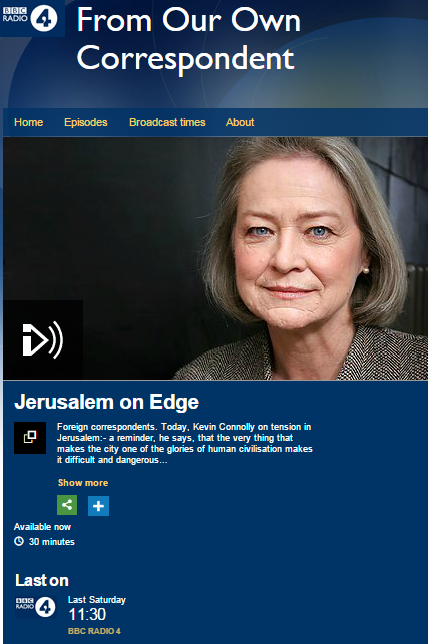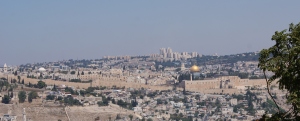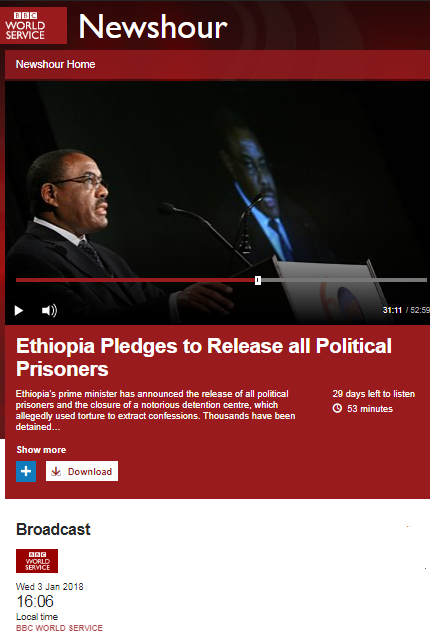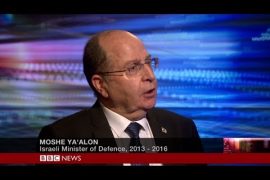The November 8th edition of the BBC Radio 4 programme ‘From Our Own Correspondent’ opened with an item by Kevin Connolly on the topic of Temple Mount. The programme is available here, with the relevant segment commencing at 00:38.
Connolly’s account includes the following:
“A strict status quo governs rights of access to this holiest of places. Muslims alone have the right to worship. Jews may visit but may not pray. Any hint of change could instantly provoke widespread disorder. Here’s how powerful that status quo remains. Jordan controlled East Jerusalem until 1967 and so controlled access to the Western Wall – insensitively but memorably known to British troops of an earlier occupation as the Wailing Wall.”
In standard BBC mode, Connolly begins his historic account from 1967 and does not inform listeners when, why or how Jordanian control commenced or what the situation was before that brief 19-year stint of Jordanian occupation. He also fails to mention that Jordanian control of access to the Western Wall meant no access for Jews, along with the destruction of numerous synagogues in the Old City, from which all Jewish residents had been expelled. And of course Connolly’s description of the British administration of the Mandate for Palestine as an “occupation” is inaccurate. He continues:
“So when Israel captured the Old City in 1967 it put the most important place of prayer in Judaism back in Jewish hands.”
Connolly is of course referring to the Western Wall in that statement – as is apparent from his next lines – but his description is misleading in that it fails to inform listeners that whilst the Western Wall is in indeed the most important place to which Jews have access to pray, it is not the most important place. He goes on:
“But Israel also captured Haram al Sharif, or Temple Mount. There’s a photograph that shows young paratroopers flying the Israeli flag nearby. Their commanders quickly and smartly ordered them to take it down and then returned control of the sanctuary which contains the Al Aqsa Mosque and the Dome of the Rock to the control of the Islamic religious authorities. Even in the afterglow of a series of stunning military victories that defined the modern Middle East, Israel was anxious to avoid doing anything here that might provoke a wider holy war. After all, a clumsily managed row over the site under British rule in the 1920s had triggered violent rioting and widespread loss of life.”
Connolly’s opaque reference is of course to the 1929 riots but he refrains from informing listeners which party instigated the “violent rioting” or of the similarity between the pretext used to incite then and that being used by the president of the Palestinian Authority and others today.
“In September 1928, a small group of Jews erected a “mechitza” (a divider to separate men and women during prayers) for Yom Kippur prayers at the Western Wall. The British forcibly dismantled the divider, but Husseini used this incident as a pretext to incite Muslims. He accused the Jews of attempting to seize Muslim holy sites, including the al Aqsa Mosque. […]
According to the Davar newspaper of August 20, 1929, incitement against the Jews was rampant, especially in the Jerusalem and Hebron area. Rumors were spread that Jews had cursed Islam and intended to take over their holy places; Muslims were told that it was their duty to take revenge. “Defend the Holy Places” became the battle cry.”
Instead, Connolly promotes other reasons for the current tensions in Jerusalem:
“But some Jews now talk again of revising the status quo. Why, they ask, should they not pray there since the place is sacred to them and since Israel controls access to the Old City? Jerusalem was already feeling edgy; a legacy of the summer fighting in Gaza and continuing Jewish settlement in Arab areas of the east of the city. The Israeli government says the status quo will remain, but you sense it wouldn’t take much to make things worse – a reminder to those of us who live in Jerusalem that the very things that make the place one of the glories of our shared civilization make it difficult and dangerous too.”
Whilst Connolly’s monologue puts significant emphasis on the topic of the ‘status quo’ on Temple Mount, beyond the issue of rights of worship and access he does not actually bother to inform BBC audiences what that status quo includes.
- The Waqf, as an arm of the Jordanian Ministry of Sacred Properties, would continue to manage the site and be responsible for arrangements and for religious and civil affairs there.
- Jews would not be permitted to pray on the Temple Mount, but they would be able to visit it. (This right of freedom of access to the Mount was also eventually anchored within the context of the Protection of Holy Places Law.)
- Israel, by means of its police force, would assume responsibility for security in the sacred compound, both within the site itself and regarding the wall and gates surrounding it.
- Israeli sovereignty and law would be applied to the Temple Mount as to the other parts of Jerusalem, to which Israeli law was applied after the Six-Day War. (This stipulation was approved more than once by the Israeli High Court of Justice.)
- It was later decided that the only entrance gate through which entry to the Mount by non-Muslims, including Jews, would be permitted would be the Mughrabi Gate, which is located at the center of the Western Wall, whereas Muslims would be able to enter the Mount through its many other gates.
- Over the years the raising of flags of any kind was prohibited on the Mount.
Neither does Connolly inform his listeners how that status quo has been changed over the last 47 years.
Whatever one’s opinion of the campaign by some for equal Jewish prayer rights on Temple Mount (for some reason uniformly portrayed by the BBC as a “Right-wing” issue), it is clear that the Israeli government has no intention of changing that aspect of the status quo. However, the many other components of that status quo which have changed – including damage to antiquities, unauthorized construction, restriction of access to non-Muslims and harassment of visitors – are consistently concealed from audiences in BBC portrayal of the topic. Kevin Connolly’s latest item is no exception.




